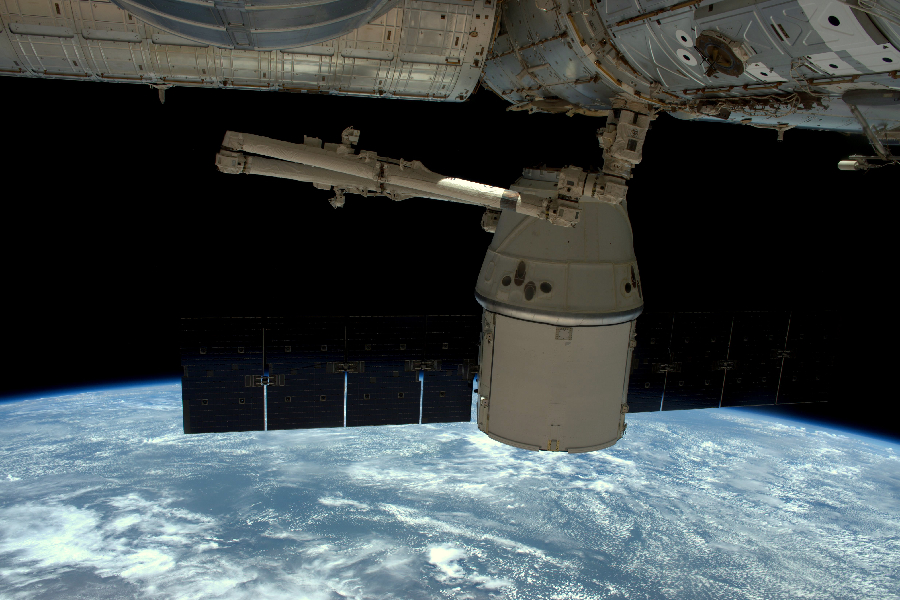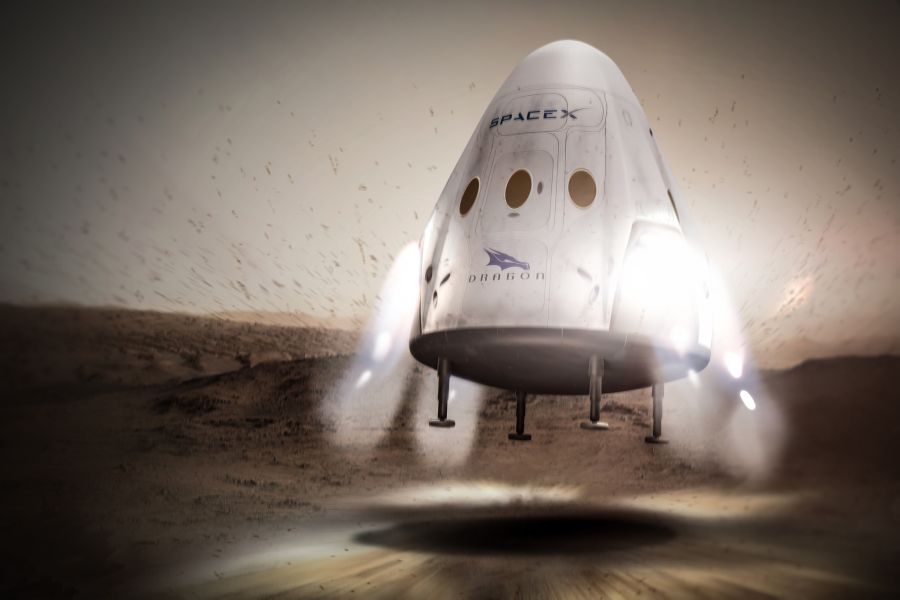
Robohub.org
Robohub roundtable: Robotics and space exploration

European Space Agency astronaut Tim Peake captured this photograph of the SpaceX Dragon cargo spacecraft as it undocked from the International Space Station on May 11, 2016. Image Credit: ESA/NASA:
Every few weeks, Robohub will post a roundtable chat and discuss an engaging topic relating to robotics. In this edition, we looked at how can robotics can be part of space exploration. Privatisation has certainly been a boon for companies, like SpaceX. What can we expect in the future? We strongly encourage our Robohub readers to chime in and be part of the conversation!
This chat features Sabine Hauert, Andra Keay, Kassie Perlongo, Yannis Erripis, John Payne and Audrow Nash, providing a range of perspectives from research, business, technical and the general public.
Robotic exploration is critical to help support any future human exploration. You only have to read the latest science/tech headlines to get an idea of the excitement happening in space robotics. Recently, UK astronaut Tim Peak remote controlled a “space-robot” on Earth from the International Space Station, as part of European Space Agency’s (ESA) project to learn how astronauts can control remote systems on other worlds. Privately funded SpaceX landed the Falcon 9 Stage 2 rocket on a drone ship at sea for the first time, and then recently did it again after sending the JCSAT-14 satellite to Geostationary Transfer Orbit.
Beyond providing regular cargo resupply missions for NASA, SpaceX is planning an unmanned mission to Mars in 2018 — 10 years ahead of NASA’s planned mission. How feasible is this? Are we launching into a new commercialised space era?
The roundtable got underway by discussing privatisation in space robotics. Largely this is viewed positively, as it has progressed tech innovation and healthy competition, integral pieces for a space programme if we expect to further space exploration. But, there were concerns we are too goal driven and not concentrating on current issues or robotic tech at home.
“I think it’s exciting to have massive, audacious goals, especially in the development of technology,” said Andra. “We’ve been missing that for a while. However on a pragmatic level, maybe looking to solve the global food supply is more achievable.”
“The private sector is [definitely] helping to drive innovation”, said Sabine. “It helps shorten timelines, gets new tech into space. Competition, bigger goals, this drives technology forward’, said Sabine. “Look at the Google Lunar X Prize. It does require a certain amount of new tech, plus, it’s exciting for the younger generation to get involved in STEM.”
“Would you say private companies are disruptors?” said Kassie. “Are companies like SpaceX and Blue Origin challenging the status quo, and helping big changes happen to space exploration quickly?”
“Maybe not as disruptors, space is a private game now.” said Andra. “It’s been accepted that space exploration has been privatised. Space contracts are being awarded, with NASA, in part, driving this. I don’t think the speed at which this is happening is very exciting. If anything, it can make it seem less impactful.”
“Private companies were always a major part of space exploration, usually under the leadership of a public administration like NASA or ESA,” said Yannis. “These were usually big companies that moved at a slow pace, reluctant to change. Since the dot.com boom a lot of startups appeared in the space exploration sector. Most didn’t last, but the few that did moved at a much quicker pace. So, not only did they catch up with the establishment, they have become major competitors to force the legacy companies to change.”
“The fact that it is being privatised is interesting,” said Sabine. “What is it that these companies are going to want to do? Is it about mining resources on other planets? Is it tourism? What are these [commercial] companies most interested in?”
“There’s a company, Planetary Resources, who are trying to conduct asteroid mining,” said Audrow. “They are putting satellites around Earth, looking at a wide range of wavelengths with sophisticated sensing, and selling the information to help agriculture. It’s privatised, so they need to be commercially viable.”
https://www.youtube.com/watch?v=fJBiZnVsJ7g
“Automation and robotics is a necessity for space exploration, the environment demands it,” said Yannis. “More goals and more far fetched goals will push innovation forward. Also the need to send more people into space and especially people that will be either tourists or simply not extensively trained astronauts will pose the demand of more and more automation and robotised vehicles.”
“Also,” added Sabine, “we considered robotics as the tech that’s going to go into space. But if you look at SpaceX, the drone ship they used is robotics. ”
“The new manned space vehicles under development are, for the most part, robotic spacecrafts. There’s room for chasing many goals, big or small. The private sector is largely unregulated so every team can follow its path and the product is a greatly increased variety of endeavors.” said Yannis.
Space robotics and tech integration
“People say, isn’t it fantastic all these improvements in technology? Aren’t these going to start influencing robotics? But every single advance they are describing: artificial intelligence, natural language processing, computer vision, inverted pendulum, all of this has come from robotics. So in many ways, the technologies of today are reaping the dividends of robotics research. But we’re starting to see more complex, yet affordable, robotics at the end point.”
“Space has to be so safe”, said Sabine. “I don’t think they are developing anything absolutely crazy. They are mostly good at integrating and making existing technology space-ready.”
“They do modular design towards this. The R2 is modular design and they can upgrade it. They can make smaller more fundamental changes. The technology can progress incrementally,” said Audrow.
“Most new companies follow the technological path already explored decades ago. Macroscopically there’s evolution (incremental at most), not revolution, however the procedures and the approach is vastly different.” said Yannis. “The new companies usually follow practices developed very far from the military cold war programs or the current aerospace and defence sector. Even if NASA is a major client, it’s not the main one, nor is it defining the direction. The result is companies like SpaceX with a product that follows the same general architecture of many other projects before it (for example propulsive landing has been demonstrated years before in a smaller scale) but vastly cheaper and developing at a vastly faster rate.”
Mars landing in 2018 — hype? What about regulations?
“Is the SpaceX press about their plans to land on Mars in 2018 all hype?” asked Kassie. “It doesn’t seem like enough time, given that’s only in a couple of years.”

Is this something to look forward to in 2018? Source: SpaceX
“Both SpaceX and Blue Origin started from scratch. It was a lot faster than what all the other companies were doing. There has been risk and there have been failures but not as many as one would expect.” said Yannis. “Usually their announcements are neither optimistic or pessimistic, SpaceX usually fulfills all the goals they announce, even with the occasional delay or mishap.”
“With the machine learning field, people worry there are few companies owning and sharing most of the data and the algorithm,” said Sabine. “This may give a lot of power to a handful of companies. Do we need to worry about the same thing happening in space robotics?”
“We already have this in air travel with Boeing and Airbus,” said Andra. “It doesn’t seem to have as big of an impact. With SpaceX it is all about a space rocket.”
“No, I don’t think so. Monopolies are usually formed from the environment created by the regulations. SpaceX may have a great pace, and it may be a media favourite, but there are other companies showing progress (Blue Origin, Virgin Galactic, Orbital ATK and the legacy companies like Boeing or Airbus) and more will definitely follow.”
The roundtable agreed that many of the changes happening are definitely having an impact on accessibility and financing of future space exploration.
“The main application (and robotics is a big part of it) is making space cheaper and more accessible.” said Yannis. “Given that, everything else will follow. A great example is the smaller and cheaper satellites. Through the last decades satellites have become cheaper, smaller, and more affordable. A startup or a university can afford to launch a cubesat that will be capable of performing a substantial mission.” said Yannis.
Where do you think space robotics will lead into the future? Let us know in the comments!
Also listed below are people to watch who are involved in space robotics:
Dr Terry Fong is the Director of the Intelligent Robotics group at the NASA Ames Research Center and is Project Manager of the NASA Human Exploration Telerobotics (HET) project, which tests advanced telerobotic systems on the International Space Station. Dr. Fong is also Deputy Lead for the NASA Resource Prospector Mission lunar rover.
Joe Parrish is Deputy Manager, Mars Program Formulation Office, Mars Exploration Directorate at Jet Propulsion Laboratory and deeply involved in the development of the external manipulators on the International Space Station.
John Lymer is Chief Robotics Engineer, Space Systems Loral and formerly Chief Engineer for the International Space Station Robotics. SSL design and build satellites and spacecraft systems for commercial and government customers around the world. He leads the development and deployment of microsurgical robotics that operate inside an MRI scanner and nuclear reactor restoration robotics, all enabled by the reuse of space robotics technology.
Marco Pavone is the Director of the Autonomous Systems Laboratory, Stanford and is a NASA Early Career Faculty. The Autonomous Systems Laboratory develops methodologies for the analysis, design, and control of autonomus systems, with a particular emphasis on large-scale robotic networks and autonomous aerospace vehicles.
Kevin Peterson is the Chief Technology Officer at Astrobotic Technology in Pittsburgh, Pennsylvania. Astrobotic is developing space robotics technology for planetary missions. It was founded in 2007 by Carnegie Mellon professor Red Whittaker, with the vision of lunar exploration through the development affordable and innovative robotic technologies. With its partner Carnegie Mellon University, Astrobotic is pursuing the Google Lunar XPRIZE.
tags: cx-Politics-Law-Society, Robohub roundtable, Space




